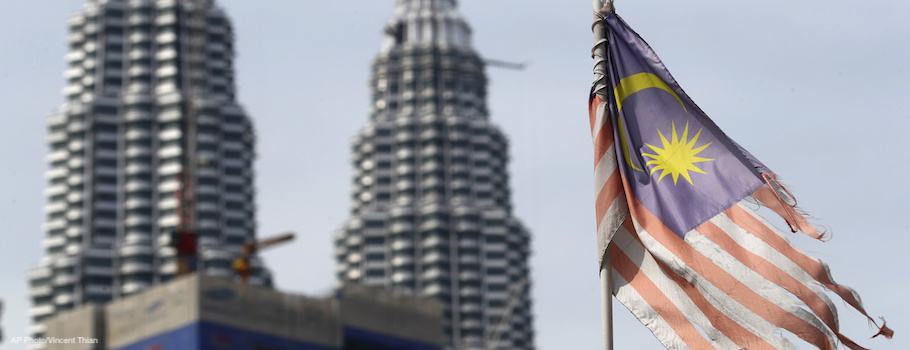IDENTITY POLITICS COMES TO THE FORE IN MALAYSIA

MALAYSIA’S 14th General Election next month will attest to the longevity of democracy in the country. However, it will also reveal how identity politics is refashioning the electoral landscape of one of South-east Asia’s economically most successful nations.
Its neighbours will have to deal with the effects of political evolution in the Muslim-majority nation.
A visceral array of ethnic forces has shaped up around the confrontation between the ruling Barisan Nasional (BN) coalition and the opposition. This deployment of forces is represented primarily by Prime Minister Najib Razak; veteran opposition leader Anwar Ibrahim; and former premier Mahathir Mohamad.
Mr Anwar has joined forces with his nemesis, Dr Mahathir, who ousted him once from the deputy premiership, to take on Mr Najib, whom Dr Mahathir helped bring to power but whom he now wishes to depose because of fundamental differences over the way ahead for Malaysia.
Behind these figures, and lesser people waiting in the wings, is a coming settling of political scores among three forces.
The first is an avowed national compact that has been built up since the country’s independence in 1957 – one based on the concept of ethnic Malay supremacy in politics and which includes safeguarding the economic interests of rural Malays, and yet is multiracial in demographic scope.
That compact is represented by BN, whose leading member is the United Malays National Organisation, but which is supported by the Malaysian Chinese Association and the Malaysian Indian Congress.
Then, there is an alignment of ethnic Chinese and liberal, largely urban, Malay and Indian interests embodied in the secular opposition alliance, the Pakatan Harapan (PH). It draws strength from the nominally multiracial but heavily Chinese Democratic Action Party.
Then, again, there is the implacable religious agenda of the opposition Parti Islam Se Malaysia (PAS), which is bent on turning Malaysia into an Islamic state replete with religious syariah laws that include criminal hudud penalties.
Thus, BN’s Malay-based but inclusive ethnic nationalism will be tested by the two alternative choices: PH’s expansive and liberal redefinition of Malaysian ethnicity, and the strictly Islamic vision of PAS.
The results of the election will turn on how ethnic affiliations envision a Malaysia for all. No matter how much every side says that it is on the side of democratic pluralism, this election will be about identity politics.
That is hardly surprising. Malaysia’s political parties are essentially racial but come together in multiracial coalitions for the purpose of contesting for power.
This is unlike in Singapore, where all viable political parties are multiracial in composition and electoral appeal. In Singapore, as in Malaysia, “race” is not a dirty word, but in Malaysia, parties by and large represent racial and not pan-ethnic constituencies.
This general election will show how the politics of racial identity squares up against calls for change made by Malaysians, particularly the young, who are concerned over economic issues such as official and corporate corruption and the rising cost of living.
These secular concerns cut across Malaysia’s ethnic divisions. Should racial-religious choices win over the secular issues, Malaysian polity could be expected to harden along ethnic lines. A good showing nationally by PAS, whose electoral appeal is limited now to the states of Kelantan and Terengganu, would suggest that Malaysia’s Muslims are willing to emphasise the exclusivity of religious identity over what unites them with non-Muslim Malaysians.
Likewise, a strong showing for PH, based on a groundswell of Chinese support, would indicate that the community sees its future as lying in a relatively combative relationship with the Malay-led national establishment.
It is BN, tarred by corruption and the inevitable attrition of incumbency, that holds out a cruel choice for Malaysians: prefer the known limitations of political continuity, or take a chance on the unknown pitfalls of systemic change.
REGIONAL IMPLICATIONS
The poll results will be watched closely in neighbouring countries, particularly Indonesia.
There, the ethnic right is trying to make a comeback at two levels: At the bottom, there is Muslim street vigilantism; at the top, ironically, several retired military leaders, associated with the once-staunchly-secular army, are using Islam to make a political comeback.
That development is worrying for democracy in the world’s largest home for Muslims. If PAS does well next door, it will improve the prospects of religion-based parties in Indonesia.
If PH takes the Malaysian political imagination by storm, it will alarm nativist elements in Indonesia, which are concerned over the prospects of Indonesian Chinese adding political influence to their extensive economic portfolio.
If BN emerges victorious, it will benefit the sway of mainstream, fundamentally secular parties in Indonesia.
Elsewhere in South-east Asia, the progress of identity politics in Malaysia beyond traditionally-drawn boundaries will embolden Buddhist groups in Thailand and Myanmar, some members of which have tried blatantly to draw religion into politics.
Singapore has no choice but to deal with whoever retakes or takes power in Malaysia, on the basis of the sovereign equality of states. A Mahathir administration would not be favourable to closer economic ties with the Republic, and any gains for PAS would cast a shadow on the secular basis of democracy that Singaporeans take for granted in their own country. But if that is to be Malaysia’s future, Singapore will have to live with it.
Farther afield, China needs to be wary about how it responds to a spectacular upset win by PH. Whether or not the link is deserved, a rising China is in danger always of being tied to the aspirations of the ethnic Chinese in South-east Asia. To its credit, Beijing has kept clear of Malaysia’s politics on the whole, limiting itself to cultivating profitable relationships with the Malaysian economic elite, which includes the ethnic Chinese. China would need to stay on that course, no matter what the election outcome is.
All in all, the coming Malaysian General Election will refocus attention on what drives South-east Asia politically.

